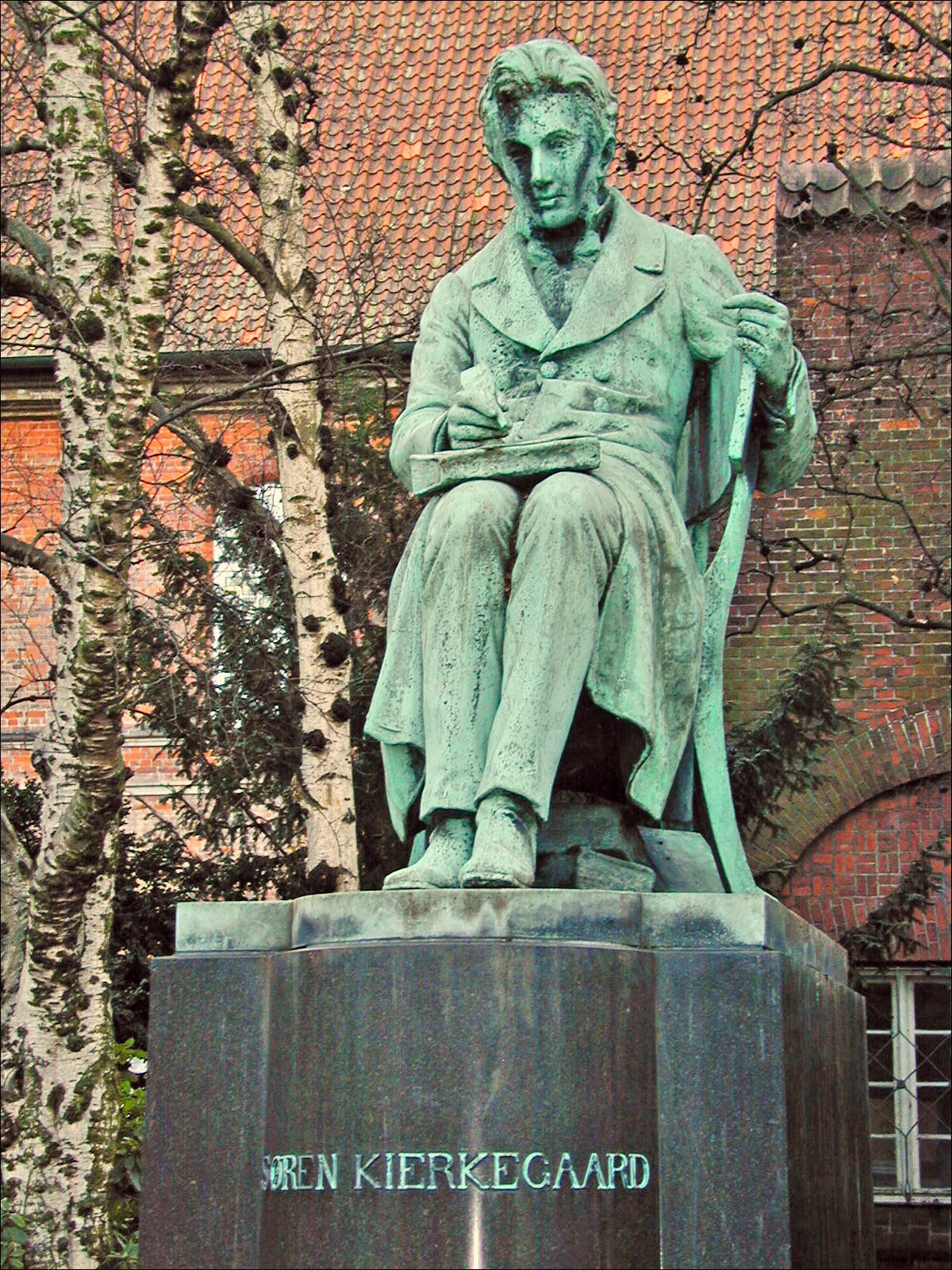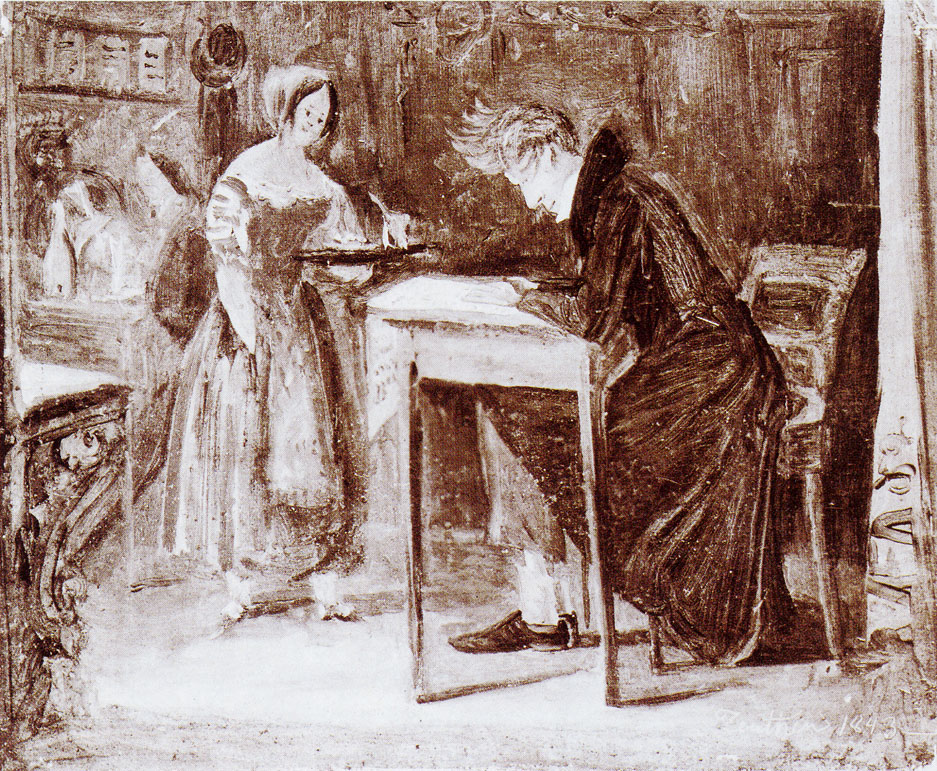 Søren Kierkegaard (1813 – 1855) was a Danish Philosopher and Theologian who lived in Copenhagen. Kierkegaard is most well known as an Existentialist and a critique of the Established Church (and the Church of Denmark in particular), however this is not what has drawn me to him recently.
Søren Kierkegaard (1813 – 1855) was a Danish Philosopher and Theologian who lived in Copenhagen. Kierkegaard is most well known as an Existentialist and a critique of the Established Church (and the Church of Denmark in particular), however this is not what has drawn me to him recently.
Kierkegaard used many pseudonyms for his works, the names represent his disposition and the character of the work, but also may have served to provide Kierkegaard anonymity while he was at the theater (to keep gossip from getting out of hand.) Some of the more well known pseudonyms are: Judge Williams, Constantin Constantius, Johannes Climacus and Anti-Climacus. Kierkegaard separated Philosophy from Theology, and earlier in life he favored the prior, but late in life he reversed this order of separation by putting Theology before Philosophy. According to the biography I'm reading, this Johannes Climacus was an atheist, and Kierkegaard's alteration of the name and character to Anti-Climacus represented this shift from Philosophy to Theology. Two of Kierkegaard's greatest theological works were written under the pseudonym Anti-Climacus: Sickness Unto Death and Practice in Theology (also titled Training in Theology).
 I'm reading a series of books on and by Kierkegaard that were recommend by scholarly friend of mine. The above mentioned biography is A Short Life of Kierkegaard by Walter Lowrie. The work is an abridgement of a larger biography by the same author, and it is reduced to the events of Kierkegaard's life at home and away with only brief explanation of his books or thought. The book helps put Kierkegaard in perspective by explaining his broken relationship with his wealthy father, the deaths of most of his siblings and also his broken engagement with Regina. The biography tells a story of a man trapped by sin and despair, not of a man of exemplary Christian living. It's only after his inheritance runs out that Kierkegaard at last turns to Theology and begins to climb out of his life long Despair. Particularly after he lives past the age of 34, which he did not believe possible. He also believed that 34 was the maximum life span he would obtain, and squandered his fortune intentionally before this age of 34.
I'm reading a series of books on and by Kierkegaard that were recommend by scholarly friend of mine. The above mentioned biography is A Short Life of Kierkegaard by Walter Lowrie. The work is an abridgement of a larger biography by the same author, and it is reduced to the events of Kierkegaard's life at home and away with only brief explanation of his books or thought. The book helps put Kierkegaard in perspective by explaining his broken relationship with his wealthy father, the deaths of most of his siblings and also his broken engagement with Regina. The biography tells a story of a man trapped by sin and despair, not of a man of exemplary Christian living. It's only after his inheritance runs out that Kierkegaard at last turns to Theology and begins to climb out of his life long Despair. Particularly after he lives past the age of 34, which he did not believe possible. He also believed that 34 was the maximum life span he would obtain, and squandered his fortune intentionally before this age of 34.
I'm reading A Short Life of Kierkegaard immediately after reading Sickness Unto Death. Kierkegaard's dialectical explaination of Despair in Sickness Unto Death is what has drawn me to read his works. Kierkegaard was initially attached to Schelling's criticism of Hegel, but only after hearing Schelling, did Kierkegaard abandon Schelling to derive his ownership of dialectic thought. My scholarly friend suggested that Kierkegaard's Either/Or could be fairly titled Either/Or/Or. In Sickness Unto Death, Kierkegaard describes Despair as the desire of riding oneself of oneself and being unable to do so. He uses the example of a man who desire to be Caesar, and describes his despair as not the failing to be Caesar but the hatred of being a person unable to be Caesar, because the failure to be Caesar is something that cannot be lived with for that despairing person. The discussion of Despair as negation is very helpful, and Kierkegaard identifies Despair with Sin in that book, and say many interesting things such as a person who is aware of their Despair is capable of being cured from their sickness, but a person in Despair will be unaware of their sickness until they recover.
I'm planning to read Practice in Theology soon, and hopefully another book analyzing Kierkegaard's Thought. Paul Tillich said that Karl Barth did not include Kierkegaard in his 19th Protestant Theology because Tillich believed Kierkegaard should be classified among the 20th century or later authors.
In conclusion, I found it interesting in A Short Life of Kierkegaard that Lowrie writes that Kierkegaard was dismissed as a Catholic and a Humanist by Karl Barth (and his followers). I look forward to learn more from my scholarly friend how Barth and Kierkegaard relate.
"But in addition to this concise positive orientation, a negative orientation may be even more necessary, i.e. a warning against what Professor Hirsch calls "the well worn paths of German misinterpretation." When Karl Barth jettisoned S.K. with the declaration that essentially he was a Catholic, he implicitly acknowledged that he had misinterpreted him in the first instance. But Barth's followers still misinterpret S.K. when they pretend to derive from him their doctrine which posits an irreconcilable opposition between the religion of transcendence ("the infinite yawning qualitative difference between God and man," to use S.K.'s phrase which defines "religiousness B" of the Postscript), and the religion of immediacy ("religiousness A") -- as though this was the either/or proposed by S.K."
-- page 173. Walter Lowrie, A Short Life of Kierkegaard



February 8th, 2022 - 06:34
Greetings!
First, thank you for the incredible post! I am entering into S.K., due to my interest in Barth, and find S.K. somewhat challenging to comprehend. The sentence I have quoted below paints my confusion most clearly. Would you be willing to clarify this statement for me? Also, are there any other dialogue partners, possibly even more important to understanding Barth than S.K., for understanding Barth that you would recommend that I read?
The quote: “But Barth’s followers still misinterpret S.K. when they pretend to derive from him their doctrine which posits an irreconcilable opposition between the religion of transcendence (“the infinite yawning qualitative difference between God and man,” to use S.K.’s phrase which defines “religiousness B” of the Postscript), and the religion of immediacy (“religiousness A”) — as though this was the either/or proposed by S.K.”
I appreciate all the work you do on this page.
Many Blessings,
Dylan Gunter